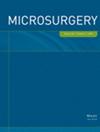The Impact of Depression and Anxiety Comorbidities on Acute Postoperative Pain After DIEP Flap Breast Reconstruction
Abstract
Background
Depression and anxiety have a complex association with opioid dependence, though their impact on acute postoperative pain is unclear. The present study investigated the impact of depression and anxiety on acute postoperative pain and opioid requirements following deep inferior epigastric perforator (DIEP) flap breast reconstruction.
Methods
Patients receiving DIEP flap breast reconstruction were retrospectively identified from 2019 to 2023. Patients were classified into the psychiatric comorbidity (PC) group based on a history of depression or anxiety diagnoses, or the control group. Pain (0–10 Numerical Rating Scale [NRS]) scores and cumulative inpatient opioid requirements (in morphine milli-equivalents [MMEs]) were compared between groups. Linear regression analysis assessed the association of psychiatric comorbidities with pain outcomes.
Results
In total, 557 patients were included, of which 11.4% reported a psychiatric history. The PC group was younger (50.0 vs. 52.7 years, p = 0.032) and more frequently reported current marijuana use (15.6% vs. 4.3%, p = 0.001) and former smoking (51.6% vs. 24.5%, p < 0.001). The PC group had higher mean (2.5 vs. 2.0, p < 0.001) and maximum pain scores (8.6 vs. 7.8, p = 0.003) than the control group, which corresponded to higher opioid requirements (256 vs. 223 MMEs, p = 0.041). Psychiatric comorbidities were associated with higher average and maximum pain scores (p < 0.01) while current marijuana use was associated with higher opioid requirements (p = 0.033).
Conclusion
Patients with depression or anxiety comorbidities tended to have greater acute postoperative pain and opioid consumption. Marijuana use was also more prevalent, potentially exacerbating pain outcomes, and risk of opioid dependence. These findings will inform patient discussions and targeted interventions to mitigate opioid misuse.

 求助内容:
求助内容: 应助结果提醒方式:
应助结果提醒方式:


